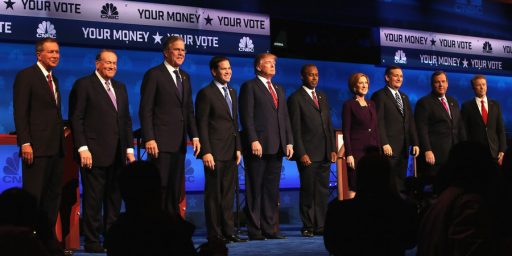Bush’s New Script
Dan Balz believes President Bush is departing from the gameplan that has won him three previous elections.
The opening stages of President Bush’s reelection campaign represent a dramatic departure in tone and style from Bush’s campaigns for governor and president. The man who calls himself a wartime president has become a warrior as a candidate.
Bush’s earlier campaigns were notable for their positive tone, the candidate’s buoyant optimism and an agenda focused on a few specific policy proposals. But the combination of a presidency transformed by the terrorist attacks of Sept. 11, 2001, and the partisan polarization that exists nationally, have produced a new script in 2004.
In contrast to those previous runs for office, Bush’s reelection campaign has been notable for its quick plunge into attacks on his Democratic rival, Sen. John F. Kerry (Mass.), its defensive tone and the absence of a tight agenda of policy proposals that would animate a second term in office. His first positive ads were modest in describing Bush’s accomplishments, and his first negative ad, which began airing Friday, surfaced far earlier than anyone outside his campaign expected.
The new tone threatens to rob Bush of his assets from successful past campaigns, according to some strategists. Most prominent is the easygoing personality that helped soften his image and attract swing voters who did not always agree with some of his conservative views; but his three years as president have left Americans more polarized in their perceptions of Bush as a leader.
It is not clear that the two Bushes — the firm and sometimes-grim leader of the war on terrorism and the cheerful, wisecracking candidate the public saw in 2000 — can coexist successfully in this campaign. By leading the attack on Kerry and doing so eight months before the Nov. 2 election, Bush has stepped from the Oval Office into the trenches, potentially denying himself what has been seen as one of the most potent weapons of any incumbent seeking reelection: retaining the power and aura of the office itself as long as possible.
***
One of Bush’s most trusted advisers said the key is striking the right balance. “I think people want to see resolve and confidence and steel and determination in their wartime commander in chief,” he said. “They recognize that the war on terror is a dangerous and unprecedented war, so endlessly cheery optimism is not the right note. . . . You can be a wartime leader who strikes the right balance between confidence and optimism about the goal and with steely determination about what needs to be done.”
As best as I can determine at this early stage, there are two issues around which the race will gel: national security and the economy. The general perception is that the economy is weak, so a Reaganesque Morning in America campaign would make Bush appear out of touch. So, he needs to appear to be working to get the economy moving again–despite the fact that it’s essentially out of his hands. But, at best, this is a neutral issue for him: When the economy is weak, the challenger can get away with whining about how bad it is and blaming it on the incumbent. So Team Bush needs to put as much of the campaign’s focus as possible on the security issue, contrasting a resolute wartime commander-in-chief with a guy with whom it would be risky to trust with the reins of power.






No plan survives contact with the enemy. Times change.
Good leaders learn how to adjust to new battlefields.
—